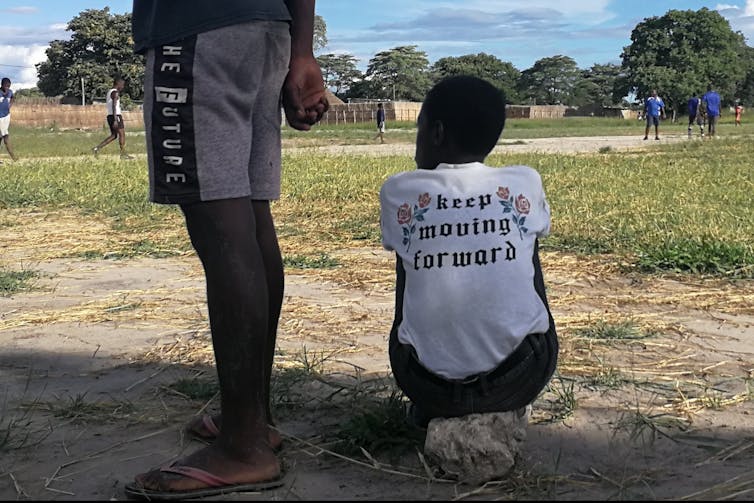
Thomas Widlok, University of Cologne and Joachim Knab, University of Cologne
“African time” delivers more hits on internet searches than “African nature” or “African people”. This shows that people seem to need to feed a stereotype.
As anthropologists, we’re interested in why this need exists and what impact it has on people’s lives.
Various scholars have discussed the idea of an African sense of time. Following the Kenyan-born philosopher John Mbiti, some have suggested that Africans have no concept of the future. Others have claimed that the “relaxed” African attitude towards time, of being late and being focused on the ancestral past, prevents economic development. While such generalisations are discredited in science, they seem to live on among policy makers, state planners and NGO workers.
In our recent paper, we looked at examples of this stereotyping and tried to explain why it happens. We believe it is connected to the ways in which state and non-state planners try to make sense of the diverse expectations and orientations of citizens.
Our discussion builds on an idea that comes from political scientist James C. Scott. He argued that administrators seek to make the messiness of everyday life “readable” so that they can deal with it more easily. The effect is that diverse ideas about the future are streamlined and merged into national plans, project plans and budget periods.
Why time matters
We are part of a larger research team at the University of Cologne in Germany. With our African counterparts, we have carried out ethnographic field research in the Kavango-Zambezi region in southern Africa. And we are now expanding our work to eastern Africa. We primarily accompany people in their everyday lives, seeking to tie the abstract topic of time back to the ordinary situations that we all share.

The idea of African time is not merely a philosophical interest. It has become an integral part of state politics, specifically identity politics. States not only introduce clock time and standardised calendars. They also expect their citizens to contribute to development goals. The state tries to commit everyone to national targets, deadlines, plans and procedures. They achieve this with the help of project spreadsheets, media announcements, meeting schedules, work packages and other tools.
States are keen to streamline commitment to future national goals. In our experience from southern Africa, the role of NGOs in this process is often to harmonise the time-frames of marginalised citizens with those of state planning. Citizens navigate seasonal uncertainty, engaging in everyday improvisation to earn a living. To survive, they often need to revise their personal plans and timelines. State and NGO workers, by contrast, are expected to administer, control and direct the lives of people in a linear fashion. They set goals and execute planned projects.
We investigated examples from present-day Namibia. Here, as elsewhere, the state is instrumental in creating age brackets that define when citizens qualify for state services, including education, school feeding and pension payments. The state also sets the time frame for distributing drought relief and other benefits. It also decides when citizens have to provide services to the state – like paying tax, or getting tested for diseases. Individuals usually have a variety of personal plans and agendas. But from the state’s perspective, that is irrelevant. Everyone needs to follow the “proper procedures” of accountancy and policy implementation.
Moreover, most African states publish national “visions” for the future. Marginalised citizens have to comply with the expectations written in such visions, if they want recognition and assistance. Only certain linear timeframes can be “read” by the state (past-present-future, plan-execution, before-after). But other timeframes exist. Some are tuned to seasonal cycles, others are task-oriented rather than clock-oriented. They don’t sit easily with government’s expectations.
All this serves to reproduce the old expectation that all Africans follow a stereotypical “African time”. One way of time organisation is set as the standard, and all other forms are treated as problematic and special.
Choose your time
We aren’t attacking or recommending specific strategies of how to organise diverse expectations and aspirations into “future planning”. Our research reminds us that using multiple ways of considering time, and different ways of timing what we do, works well, as people move from one situation to another.
Previously, scholars believed that every “culture” used a specific time frame. But it’s evident that social agents (individuals and groups) possess multiple ways of dealing with time. In our everyday lives, we all choose from this repertoire, according to different situations and circumstances. The state (and NGOs) erode this diversity when they streamline time. It is neither right nor necessary.
“African time” is one option in a repertoire that is available not only to Africans but to everyone else. As a stereotype, it is used to discredit alternative forms of organising things, which depart from the dominant visions of development. We show that the state and other powerful players are not neutral in this. Their interests lie in getting things “lined up” and organised “according to plan”. But opening up the future for everyone starts with opening up to the diverse ways of thinking about time.![]()
Thomas Widlok, Professor for the Anthropology of Africa, University of Cologne and Joachim Knab, PhD-student in Social and Cultural Anthropology, University of Cologne
This article is republished from The Conversation under a Creative Commons license. Read the original article.

